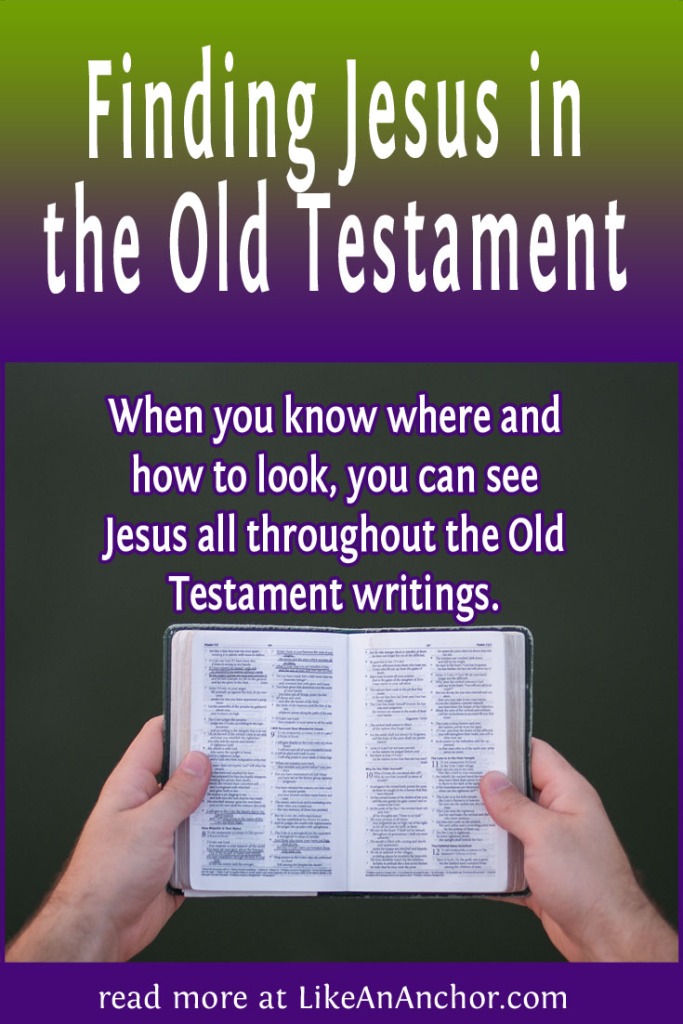Several times during Jesus’s ministry, He told people that the scriptures they read told them about Him. For example, He told some, “You study the scriptures thoroughly because you think in them you possess eternal life, and it is these same scriptures that testify about me” (John 5:39, NET). Remember, they would have just had the Old Testament at this time. The gospel events were happening in front of them, but they didn’t have written records yet pointing out which prophecies Jesus fulfilled and cross-referencing Old and New Testament writings the way we do today. And yet, Jesus told people that “everything written about me in the law of Moses and the prophets and the psalms must be fulfilled” (Luke 24:44, NET). He expected at least some of the people He spoke with to recognize that the law, prophets, and psalms all pointed to a Messiah and that He was that promised Messiah.
When I think about these scriptures, I wonder if I could have recognized that there was a coming Messiah from reading the Old Testament (OT). Even with the benefit of New Testament (NT) perspective, I struggle to see Him in the law of Moses. Not even all of the psalms and prophecies that NT writers identify as Messianic seem like something I’d have recognized when just reading the OT. Like the disciples on the road to Emmaus, we need Jesus to intervene in our minds to open our understanding (Luke 24:13-35). In fact, there are scriptures indicating it’s impossible to understand God’s word or have a relationship with Him unless the Father and Jesus take an active role in your life (John 6:44; 14:6).
At this point, we might ask ourselves several different questions, such as, “How much did believers in the Old Testament know?” and “How did salvation through Jesus (since you can’t be saved through anyone else [Acts 4:12]) work for people who lived and died before His sacrifice?” For today, though, I want to focus on the question, “Which verses in the Old Testament clearly point to Jesus Christ?” Or, since we’ll be looking at the OT that was written in Hebrew, to Yeshua the Messiah?
Clarifying Names
The name “Jesus” is the English transliteration (representing a word from one language with the sounds and alphabet of another) of the Greek name Iēsous, which comes from the Hebrew name Yehoshua or Yeshua (H3091). The name means “Yahweh is salvation,” from the words Yahweh or Yehovah (H3068, God’s proper name [Ex. 4:15-16]) and yasha (H3467, “to save, be saved, be delivered” [BDB]). Yasha is the main root of a group of Hebrew words. Frequently used derivatives include yeshuah (H3444, salvation), teshuah (H8668, help, rescue, salvation) , and names such as Joshua, Hosea, Isaiah (Theological Wordbook of the Old Testament [TWOT] entry 929).
You won’t ever see the name “Jesus” in the Old Testament, but you frequently see the name Yeshua: it is translated into English as Joshua. There’s no prophecy in the Old Testament that says the Messiah will be named Yeshua. When Jesus was born, His name likely wouldn’t have stood out too much. Joshua is a popular name even today, and I doubt it was unusual in Jesus’s day considering the historic Yeshuas that people would have been familiar with (e.g. Moses’s successor Joshua son of Nun and Joshua the son of Josedech who appears in Haggai’s prophecies).
“Christ” is more of a title than a name. It is a transliteration into English of the Greek word christos (G5547), which is a translation (rendering the meaning of a word into the corresponding word in another language) of the Hebrew word mashiyah or Messiah (H4899). Both the Greek and Hebrew words mean “anointed” (Thayer; BDB). The root word mashach (H4886, anoint or rub with oil) is used most frequently of kings and priests sanctified for the Lord, and it’s also used twice of prophets (TWOT 1255). For example, it’s used when Yahweh chose Saul as the first king of Israel.
“Tomorrow about this time I will send you a man out of the land of Benjamin, and you shall anoint (mashach) him to be prince over my people Israel. He will save (yasha) my people out of the hand of the Philistines; for I have looked upon my people, because their cry has come to me.”
1 Samuel 9:16, WEB
Mashiyah (H4899, anointed one) is most frequently used in the Old Testament to refer to kings (TWOT 1255c). It also became closely associated with the God-being we now know as Jesus. By the time Jesus arrived, the Jews of His day were looking for the promised Messiah or Christ (Luke 3:15; 22:67; John 1:41-42; 4:25-29; 7:26). We still call prophecies from the OT that point to Jesus Messianic passages. It might surprise us, then, that if we compare all the verses using yasha and its related words to all the verses using masach and its related words, there are only 5 scriptures that use both and none of them are Messianic prophecies (1 Sam. 9:16; 2 Sam. 22:51; Psalm 8:50; 20:6; 28:8).
Prophecies of the Messiah
There actually aren’t as many OT prophecies identifying the coming Messiah/Christ by the title “anointed” as you might think. It honestly surprised me, but when you realize that the Hebrew word mashiyah was “almost exclusively reserved as a synonym for ‘king'” (TWOT 1255c), then it becomes more understandable how OT readers realized that the spirit-filled, victorious, salvation-bringing God-being who would come in the name of the Lord should be called Messiah. We can see this in some of the disciples’ reactions to first meeting Jesus.
One of the two who heard John and followed him was Andrew, Simon Peter’s brother. He first found his own brother, Simon, and said to him, “We have found the Messiah!” (which is, being interpreted, Christ). He brought him to Jesus. … Philip found Nathanael, and said to him, “We have found him, of whom Moses in the law, and the prophets, wrote: Jesus of Nazareth, the son of Joseph.” …
Jesus saw Nathanael coming to him, and said about him, “Behold, an Israelite indeed, in whom is no deceit!”
Nathanael said to him, “How do you know me?”
Jesus answered him, “Before Philip called you, when you were under the fig tree, I saw you.”
Nathanael answered him, “Rabbi, you are the Son of God! You are King of Israel!”
John 1:40-42, 45, 47-49, WEB
Andrew called Jesus “the Messiah.” Phillip called Him the one “of whom Moses in the law, and the prophets, wrote.” Nathaniel called Him, “the Son of God” and “King of Israel.” They knew they were waiting for the Messiah, God’s son and the King of Israel, from reading the law and the prophets. Thanks to the Father’s revelation working in their lives, they could correctly identify that Jesus was the Christ (Matt. 16:13-20). Perhaps they were all thinking of Psalm 2, where the author talks about “Yahweh and … his Anointed,” who is also “King on my holy hill of Zion” and the Son of God.
Daniel also prophesied about “the Anointed One, the prince” (Dan. 9:25-26, WEB). Isaiah spoke of a descendent of David who would be full of God’s spirit and rule on David’s throne (implying an anointing even when it’s not explicitly mentioned) (Isaiah 9:1-7; 11:1-5; 61:1). Psalms talk about a strong, ruling, righteous, and anointed king (Ps. 45:1-7; 110:1-5). With those scriptures, as well as whatever oral traditions might have been passed down (depending on how much the people of God knew about His plan that didn’t make it into official scriptural writings), the people of Jesus’s day had the background needed to know they were looking for a Messiah. Even then, not everyone who met Jesus (Yeshua) was able to recognize that He was the Christ (Messiah). They needed God to give them eyes to see, ears to hear, and hearts to understand (Mat. 13:10-17).
Asking to Understand
When you know where to look, it’s not that hard to find Jesus in the Old Testament or to read the OT and see that there’s a coming Messiah. But without God working in your mind and heart, you won’t know to look. People can read the Bible over and over, even memorize huge sections, but still miss key truths because they’re just reading on their own with a human perspective. God is the one who makes His Bible come alive.
I think sometimes Christians forget how thankful we ought to be to God for letting us understand His word. And when we do that, we might also forget that we don’t yet know everything fully (1 Cor. 8:1-2; 13:12). For me at least, studying the prophecies of Jesus in the OT helps me realize that. Without God’s help and the records of fulfilled prophecies in the NT, I’d understand much less than I do now. And maybe there’s still more to learn, if I’m willing to ask.
“Ask and it will be given to you; seek and you will find; knock and the door will be opened for you. For everyone who asks receives, and the one who seeks finds, and to the one who knocks, the door will be opened. Is there anyone among you who, if his son asks for bread, will give him a stone? Or if he asks for a fish, will give him a snake? If you then, although you are evil, know how to give good gifts to your children, how much more will your Father in heaven give good gifts to those who ask him!”
Matthew 7:7-11, NET
We need to remember to thank God for the understanding He has granted us, and keep asking to know Him more deeply. One way we can participate in knowing Him at a deeper level is to prayerfully study His entire Bible. The questions I opened with today–“How much did believers in the Old Testament know?” and “How did salvation through Jesus work for people who lived and died before His sacrifice?”–are the types of questions a speaker at my church invited listeners to study in a message I heard last week.
That message focused on Abraham, and it’s fascinating to look at the conversations God had with him and at what the NT writers say about Abraham and God’s relationship. One verse even talks about the gospel being preached to Abraham, and in another Jesus said that Abraham “was overjoyed to see my day” (John 8:56; Gal. 3:7-16). Abraham probably knew a lot more about the Messiah than I’d realized just from reading his story, and he didn’t even have scrolls to study of the law, psalms, and prophets. Perhaps we can also understand more deeply by studying the relationships and revelation that God granted to those Old Testament heroes of faith (the people in Heb. 11, for example) and by asking God to speak into our lives similar to the way that He spoke to them.
Featured image by Inbetween from Lightstock
Song Recommendation: “Psalm 45 (A Noble theme)”






Yes we can find Jesus in old Testament
LikeLike
Jesus linked himself with the old testament
LikeLike